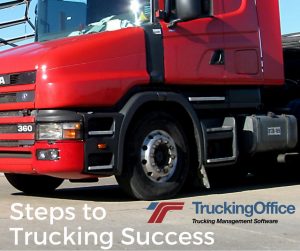TruckingOffice Wants Truckers to Succeed
We’ve been focusing some of our blog posts on goals and goal setting.
- SMART goal setting
- SCHEMES to figure out your action plan
- Measurements to determine where your strengths and weaknesses are
- Handling the Challenges of emergencies
- Staying Motivated on your trucking business goals
- Understand Your Numbers and make them work for you
- Set Benchmarks to determine your progress
- Build Your Team at home for success on the road
This multi-part series will continue to help truckers reach their dream of success as owner-operators.
What Do You Want to Achieve?
At some point, we all look at our careers and say that we want to do better. For some people, it’s about rigidly figuring the numbers, measuring everything and then going back to figure out what was going wrong.
Let’s look at what Scott Adams, the creator of the comic strip Dilbert, says (because we couldn’t say it any better ourselves!)
Going to the gym 3-4 times a week is a goal. And it can be a hard one to accomplish for people who don’t enjoy exercise. Exercising 3-4 times a week can feel like punishment – especially if you overdo it because you’re impatient to get results. When you associate discomfort with exercise you inadvertently train yourself to stop doing it. Eventually you will find yourself “too busy” to keep up your 3-4 days of exercise. The real reason will be because it just hurts and you don’t want to do it anymore. And if you do manage to stay with your goal, you use up your limited supply of willpower.
Goals don’t work for everyone.
If you’re that person, that doesn’t mean you don’t want to improve your business. It just means you need a different way to go. For you, it might be just focusing on the steps and doing what you know works. You may be one of the people who find that success isn’t a one-time goal but it is continually improved accomplishment.
Systems For Success
What’s a system? A system is a series of repeatable steps. They can be used to help accomplish a goal, or they can be the methods you decide to run your business because they’re going to make you more successful. It’s less about your focus on the goals and more about examining the steps you take to get to the goal – and beyond it.
For a trucker, the best example of a system is the transportation system itself. A shipper needs his goods transported, so he calls his preferred source, who sends a truck. The trucker picks up the load and delivers it. Then the trucker looks for the next load. That’s how this system works.
The goal of a company is to make money. The system of shipping goods isn’t the point, but without it, the company’s goal will never be reached.
Systems are the methods a business uses to be sure that all the work is done in the most profitable way possible. Some systems look bizarre from outside the corporate structure – why does the shipping document need the signature of a processor in another department? – but they have a purpose to that company.
What Systems Do You Have in Place?
I bet you’ve already got some systems in your trucking business. There can’t be a way to be an owner-operator without systems – your business would collapse if you didn’t have a billing system or a way to get your next load in place. It may not look “systematic” to you because it’s just what you do – but don’t you do it pretty much the same way every time?
Do you have a plan how to develop new customers? As an owner-operator, you’re often at risk of not finding a good load at a reasonable price. The best way to run a trucking business is to have regular customers with consistent lanes. Developing good customers to find those consistent, rewarding loads should be a priority. That should be a system you have in place.
Other systems might include using TruckingOffice to handle your billing before you leave the shipping dock. We have an optional program called FileSafe™ that can help you get your signed bill of lading image to the shipper in just a few small steps with a smartphone and get your invoice taken care of to expedite your payment. Or you may have a system for your truck’s maintenance. (I should mention that TruckingOffice offers that too – at no extra charge!)
Imagine if you could figure out if you should take a load.
Suppose you had the formula to tell you if you should take a particular load. It would take time, money, distance, tolls, living expenses, fuel… everything… and give you the answer “Yes” or “No” so that you’d make money on every load.
If you’ve been on the road for a while, I suspect you already have some sense of it. You learn some instincts for a load as you learn the roads and routes and what to expect. Your mind is creating a system for decision-making.
Maybe it’s time to make it more concrete.
Look at Your Data
Can you remember your best week ever? What did you do that week? What steps did you take that produced that memorable week?
If you can pull up that data, you’ve got the start of a system.
- What did you do that led to that week? (Customer development)
- What did you do to prepare for that week? (Maintenance, accounting management, personal training)
- How did you decide on loads that week? (Brokers, load board, or repeat customers)
Is there any reason you don’t do these things on a regular basis?
Look at Your Calendar
The slower season is coming quickly. Many truckers have to take loads that barely make any money just because they have truck payments or mortgage payments. If you know that a slow time is coming, this may be the ideal time to take some of those steps you’ve discovered from your data. If you can look back to this time last year, you’ll see what a system can do to improve your business, step by step.
Look at the Future
Random chance doesn’t dictate what loads we get. As we develop professional skills in customer retention, business management, and trucking networks, we can increase the opportunities for better loads and more profit. You can build a system that will If goals aren’t your thing, then remember what you know works and do it.
All of this is based on you knowing what worked in the past. If you don’t have that information, you can start to keep it. (We’re going to recommend TruckingOffice, of course. Free 30-day trial. Why would you skip that?)
Test It Out
Give yourself a set period of time to try out a system. It’s easy to get discouraged when things don’t look like they’re working out. Remember that trucking is a seasonal industry and what’s happening right now isn’t what you’ll always have. You need to try out the steps and find what works for you. Some things you try won’t work. Leave them behind without regret! Move on to try something else that might work out for you. Then growing your trucking business might be something that happens while you’re being successful at all the steps you know work for you.






Recent Comments